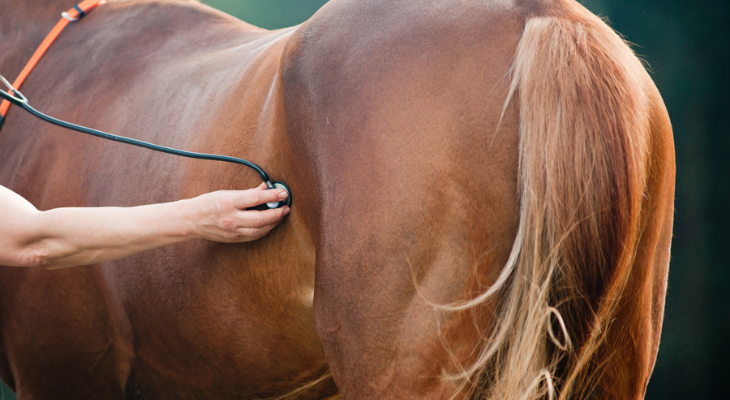COPD in Horses
- Created in Newsletter Library

How COPD Affects Horses
Does your horse cough frequently or struggle to take a breath? Chronic obstructive pulmonary disease (COPD) may be to blame. The disease is also known as reactive airway disorder (RAD) or heaves.
Common COPD Symptoms
COPD occurs when the small airways in the lungs narrow and become inflamed. The inflammation causes your horse's lungs to make more mucus. The combination of the narrow airways and the mucus make it harder to breathe. Horses that have COPD may cough often to clear the mucus from their airways and may have nasal discharge. Coughing tends to increase with activity, although a horse may cough even when it's not moving if it has severe COPD. Flared nostrils can be a sign that your horse is having trouble breathing.
Struggling to breathe can be tiring. Horses with the disease may become fatigued after exercising, even if the activity isn't strenuous.
If COPD is severe, your horse may contract its abdominal and chest muscles when breathing. The movement creates the heaving motion of the chest that gives the disease its nickname. COPD usually progresses gradually and only causes mild coughing at first.
Causes of COPD
COPD can be related to an allergic reaction to dust, fungus, mold, or pollen. Your horse may be more likely to develop COPD if it's had a lung infection in the past. Age can also be a factor, as older horses are more likely to have the disease. A dusty barn may be the worst place for a horse that has COPD. Dust, mold, or fungus in hay used as feed or bedding can worsen symptoms.
The Horse recommends only baling hay when the moisture content is 20% or less, unless a preservative is used. If you use a preservative, the moisture content shouldn't exceed 35%. Moist hay provides the perfect environment for mold growth and is more likely to create dust.
Making Life More Comfortable for Your Horse
Following these tips can help you keep COPD symptoms under control:
- Try a New Kind of Bedding. Exposure to dusty hay can cause a flare-up of your horse's COPD symptoms. Use low-dust bedding, like shredded paper or cardboard or instead. If you plan to continue to use hay for your other horses, make sure that their stalls are far from the horse with COPD.
- Move Your Horse Before Cleaning. Cleaning the barn stirs up dust and mold. It's best to take your horse outside before you begin cleaning stalls.
- Reduce Dust in Hay. Eating moldy or dusty hay can cause breathing problems. Wet the hay or place it in a steamer before offering it to your pet. If wet or steamed hay still seems to cause problems, try hay pellets or cubes instead.
- Avoid Feeding Grain. Nearly all grains have at least a little mold. Unfortunately, even small amounts of mold can trigger symptoms in horses with COPD.
- Offer Plenty of Turnout Time. Spending more time outdoors and away from a dusty barn or stable can be helpful if your horse has COPD. Keep in mind that your horse may still show symptoms when outdoors if a pollen allergy is an issue.
- Stick to Square Bales. Square hay bales are a better choice than round ones if your horse has COPD. Round bales have higher amounts of toxins, mold, and dust, Amy Johnson, DVM, told Equus. Symptoms can worsen even if your horse's only exposure to round bales is outdoors.
- Ask Your Equine Veterinarian for Help. Although making feed and bedding changes will be helpful for many horses, some will still struggle with breathing problems. If your horse is having difficulty breathing or coughing often, call your equine veterinarian. They can prescribe medication that will help open the airways and decrease mucus production.
Are you concerned that your horse may have COPD? Give our office a call to schedule an appointment.
Sources:
Equus: 10 Ways to Help Horses with Heaves, 5/6/20
The Horse: Chronic Obstructive Pulmonary Disease
EquiNews: Management of Horses with Chronic Obstructive Pulmonary Disease


